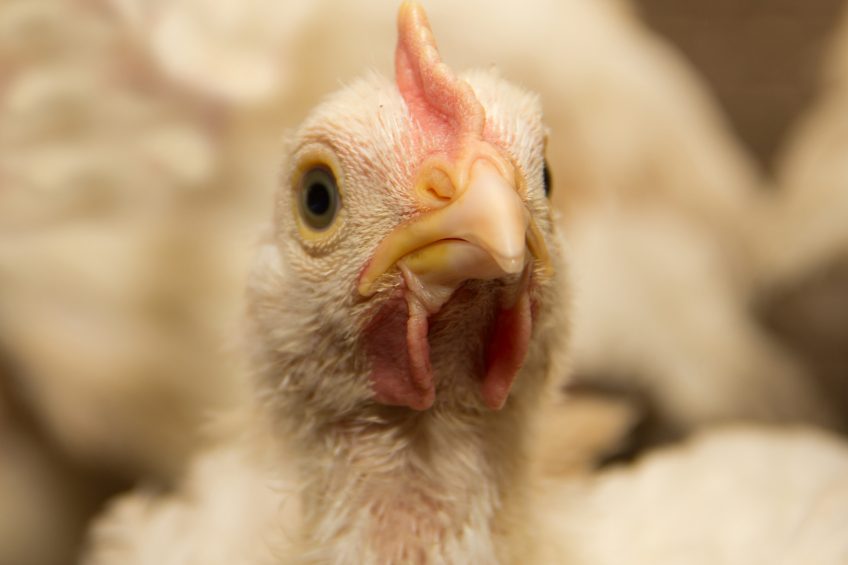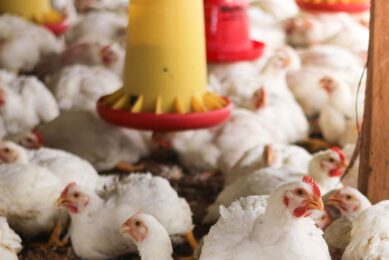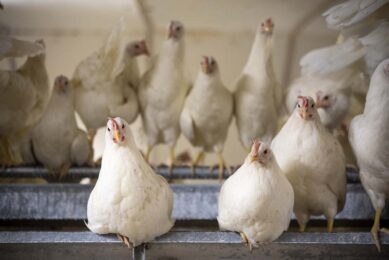Assessing the power of high dosing NSP enzymes

Reformulation of poultry diets using NSP enzymes could enlighten new ways to improve animal health and reduce feed costs in chicken production. New research has shed a light on the potency of NSP enzymes xylanase, glucanase and pectinase to save on total protein and digestible amino acids in broiler feed.
Nutritionists in animal production continuously search for a cost-effective optimum between ever changing dietary formula and increasing demands on performance. In the field, the predominant purpose of xylanases and/or glucanases is to reduce antinutritional factors and increase dietary energy. Protein and amino acid digestion improvement has been particularly associated with exogenous proteases that are generally less economic than non-starch polysaccharide (NSP) enzymes. At recommended dosage, presently used NSP enzyme concepts, improve broiler FCR over 3% in non reformulated diets of various composition (Aveve Biochem, unpublished data). Now, the potency of NSP enzymes to upgrade at double advised dosage total protein and amino acid digestibility were assessed.
Trials with reformulated diets
The effect of the supplementation of three different commercial enzyme concepts (two NSP enzyme concepts and a concentrated protease) was investigated in a reformulated diet
(-3 % protein and digestible amino acids) and compared to a standard non-reformulated diet. The aim of this study was to achieve similar performance (feed intake, body weight gain and feed to gain) whilst safeguarding animal health by a lower dietary protein level.
To achieve this study, 400 chickens were allocated into five nutritional groups:
- a positive control group (PC) fed with a standard non-reformulated diet without enzyme supplementation;
- a negative control group (NC) fed with a reformulated diet (-3% total protein and -3% digestible amino acid) compared to PC without enzyme supplementation;
- a nutritional group fed with the reformulated diet supplemented with a NSP enzyme concept (AveMix XG 10 : 40,000 endo-1,4-β-xylanase XU/g; 9,000 endo-1,3(4)-β-glucanase BGU/g) at double advised dosage (NC+XG);
- a nutritional group fed with the reformulated diet supplemented with another NSP enzyme concept (AveMix 02 CS : 10,700 endo-1,4-β-xylanase XU/g; 6,150 endo-1,3(4)-β-glucanase BGU/g; 230 pectinase PGLU/g) at double advised dosage (NC+XGP) and
- a nutritional group fed with the reformulated diet supplemented with a concentrated protease (AveMix Pro, 650 protease NHU/g) (NC+PRO).
During this trial body weight and feed consumption were recorded on day 14, 35 and 42 to evaluate the performances. This study is the first to assess the power of two highly dosed NSP enzyme concepts in a reduced total protein and digestible amino acid diet.
Body weight gain restored
Supplementation of XG, XGP and PRO to the NC diet restored the body weight gain (BWG) to a similar level as seen in broilers fed the PC non-reformulated diet (Table 1). All enzyme treatments resulted in a similar body weight gain and this was the case for each period considered (starter, grower 1 and grower 2).
In the starter period, the BWG was significantly higher (P<0.05) for xg, xgp and pro groups than for the nc group. in the second grower period of the study, bwg was similar for all diets. considering the total period (day 1-42), xgp and pro groups were heavier than the nc (p><0.05) but similar to the xg and pc group. the pro effect was expected and coincided with broiler performance and protein digestibility studies on other corn soybean meal feeds as well as and sorghum based feed. however, this study is the first to demonstrate that also nsp enzyme concepts xg and xgp at double advised dosage are able to restore the bwg in a -3% total protein and digestible amino acid reformulated diet to a level of a pc diet without reformulation. this suggests that higher dosages of described nsp enzyme concepts achieved the delivery of additional digestible amino acids to compensate for the total protein and digestible amino acid reduction.>
The feed intake (FI) remained generally similar for all groups and for each period considered. The NC diet, however, resulted in a significantly lower BWG than the XGP and PRO supplemented NC diets, as mentioned before. Moreover, the XG, XGP and PRO groups had a similar FI and BWG as compared to birds fed the PC diet. These results demonstrate a higher digestibility of the NC diets using XG, XGP and PRO.
The present study consolidates that XG and XGP concepts at double advised dosage have major potential for increasing protein value of common broiler feedstuffs, by their action on non-starch polysaccharides present in the feed and by their action on the fibres-proteins interactions.
Effect on feed conversion ratio
On the total period, the feed conversion ratio (FCR) of XG, XGP and PRO groups equalled the FCR in birds fed the PC diet. FCR of the NC group reached a higher level than all other groups (4 to 5%) demonstrating a lower digestibility compared to enzyme supplemented feed. The FCR in the XGP group on the total period was lowest, suggestive of an additional pectinase effect on broiler performance.
It can be concluded that well selected NSP enzymes, as used in this study, can lower production costs due to an increased nutrient and digestible amino acid availability and support animal health and the environment by reducing faecal nutrient waste. From an economic point of view, NSP enzymes at double advised dosage reduced starter and grower feed cost respectively by $4.40 to $5.17/tonne and $2.62 to $3.40/tonne (calculation of raw materials based on Belgian ingredient prices July 2015, standard European antimicrobial growth promoter free feeds). The return on invested enzyme cost for the NSP enzyme concepts averaged $3.28 to $1 (XG) and $2.33 to $1 (XGP), but was lower for protease, namely on average $1.86 to $1.
Join 31,000+ subscribers
Subscribe to our newsletter to stay updated about all the need-to-know content in the poultry sector, three times a week. Beheer
Beheer








 WP Admin
WP Admin  Bewerk bericht
Bewerk bericht